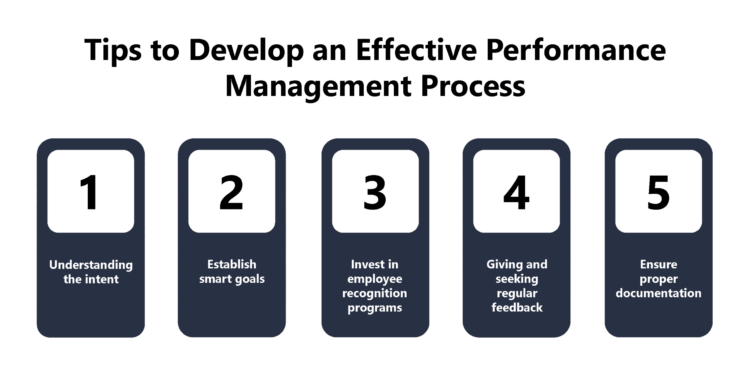1. Effective performance management in start-ups is crucial for sustained growth, but it is also challenging due to the changing KPIs and responsibilities.
2. Start-ups should establish a clear intent for performance management, set SMART goals, and invest in employee recognition to drive continuous engagement and productivity.
3. Regular two-way feedback and proper documentation are essential for transparency, tracking performance trends, and ensuring the process’s credibility.
4. Early implementation helps start-ups set clear expectations, build commitment, and enhance employee performance and retention.
Most start-ups’ initial years are exciting and overwhelming, like roller-coaster rides. However, a lack of effective performance management can prove detrimental to the venture’s continued progress. With a complete focus on business growth, start-ups often overlook their most important asset: their employees.
After all, the people, their efforts, and their commitment ensure the venture’s growth and profitability.
However, changing KPIs, new responsibilities, and goals makes the process of tracking employee performance in startups challenging.

Managing employee performance in a startup environment can be pretty challenging.
With most employees handling multiple and changing responsibilities, setting clear performance objectives for individual employees becomes difficult.
Even so, managing and measuring employee performance is critical for start-ups to understand the success of their business strategies.
It can inspire greater employee engagement, besides cultivating a work environment that drives increased focus and productivity.

Hence, start-ups need to set up scientifically defined performance management processes as early as possible.
It can ensure greater clarity in roles, deliverables, and expectations, and avoid missteps in executing business plans.
Performance management is an evolving process. However, startups must integrate key aspects early to ensure the best results.
So, here are a few points that can help start-ups develop a truly compelling performance management process:
1. Understanding the intent
2. Establish smart goals
3. Invest in employee recognition programs
4. Giving and seeking regular feedback
5. Ensure proper documentation


Start-ups should clearly understand the intent behind developing performance management processes.
Hence, they need to develop systems to better assess the performance of employees concerning the needs of the business.
In addition, it also empowers supervisors to guide employees in the right direction and ensure maximum contribution towards business growth.
Hence, a process developed with a clear understanding of intent assures the employees that it can help them succeed.
Moreover, it enables employees to treat their managers as coaches who can guide them rather than auditors, who only evaluate them.

Performance goals should enable employees to clearly understand what is expected of them and what construes the successful completion of these goals.
The goal-setting should be SMART, which means that it should be:
– Specific: Should clearly define who and what the goals are
– Measurable: Should define quantifiable targets
– Attainable: Should be challenging enough without being unrealistic
– Realistic: Should be achievable given the available resources
– Time-Based: Should have a well-defined time limit for easy tracking
However, start-ups should ensure the process is flexible enough to be effective in their dynamic work environment.

Effective employee appreciation and recognition programs can enhance the performance management process.
By recognizing and rewarding the efforts and achievements of their employees, start-ups can drive both engagement and performance continuously.
Given their limited resources, startup employees often feel satisfied with a simple thank-you or praise note from their superiors.
These simple gestures can even have a positive impact on employee performance and engagement.

Regular two-way feedback can help in developing a more transparent performance assessment and management process.
Regular feedback from their superiors can help employees with their personal and professional growth and development.
Giving feedback to superiors provides them with an opportunity to express their opinions and ideas.
Two-way feedback can also help reinforce positive behavior and build a work culture based on cooperation and coordination.

Documenting the performance appraisal enhances the credibility of the process and makes it more acceptable to employees.
Additionally, proper documentation also makes it easier for start-ups to identify trends in employee performance over time.
At the same time, it enables start-up managers to track and communicate performance changes and developmental needs over time.
Although documentation may seem like an administrative overhead, it is necessary to ensure the effectiveness of the performance management process.
Developing an effective performance management process can help start-ups set clear expectations, and build greater commitment and higher performance from their employees.

Lead author: Sagar Chaudhuri, the Co-Founder and CEO of HiFives. He is an HR Tech Evangelist with over 25 years of experience in both corporate and entrepreneurial settings. Previously, Sagar has held leadership roles with companies such as Genpact, Infosys, and ICICI Bank. He has an engineering degree from IIT Kharagpur and an MBA from IIM Lucknow. Connect on LinkedIn
Follow us on Twitter (@MyHiFives to stay updated on the latest HiFives blogs. Learn more about HR Best Practices on HiFives.